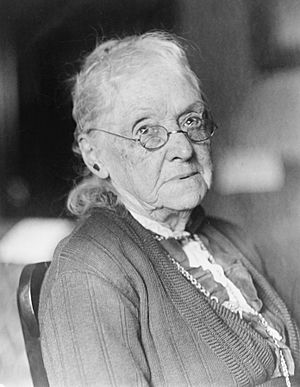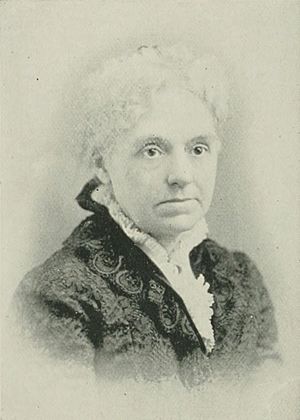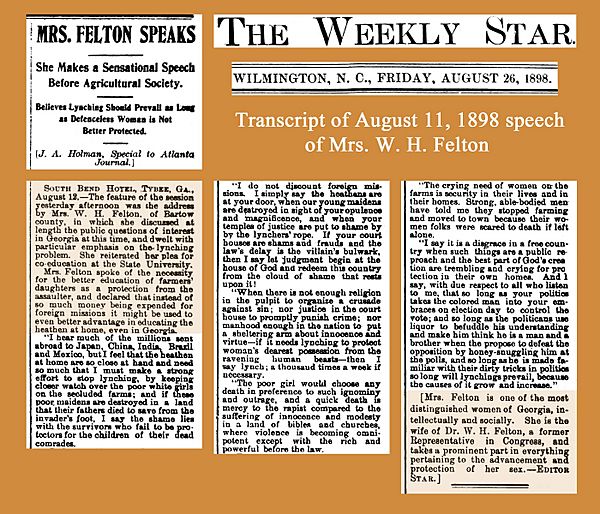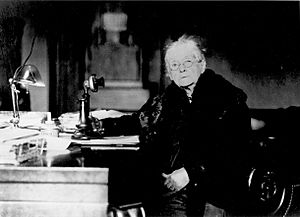Rebecca Latimer Felton facts for kids
Quick facts for kids
Rebecca Latimer Felton
|
|
|---|---|
 |
|
| United States Senator from Georgia |
|
| In office November 21, 1922 – November 22, 1922 |
|
| Appointed by | Thomas W. Hardwick |
| Preceded by | Thomas E. Watson |
| Succeeded by | Walter F. George |
| Personal details | |
| Born |
Rebecca Ann Latimer
June 10, 1835 Decatur, Georgia, U.S. |
| Died | January 24, 1930 (aged 94) Atlanta, Georgia, U.S. |
| Resting place | Oak Hill Cemetery |
| Political party | Democratic |
| Spouse | William Harrell Felton |
| Education | Madison Female College |
Rebecca Ann Felton (born Latimer; June 10, 1835 – January 24, 1930) was an American writer, politician, and activist. She made history as the first woman to serve in the United States Senate. Even though she served for only one day, it was a very important moment for women in politics.
Felton was a key figure in the early movement for women's rights in America. She worked to improve education and change prisons. She also supported the right for women to vote. However, it is also important to know that she held beliefs that supported white supremacy. She was the last person to serve in the Senate who had owned slaves.
Her husband, William Harrell Felton, was also a politician. He served in both the U.S. House of Representatives and the Georgia House. Rebecca helped him with his political campaigns. She was a very influential woman in Georgia during her time.
Contents
Early Life and Education
Rebecca Felton was born in Decatur, Georgia, on June 10, 1835. Her father, Charles Latimer, was a successful farmer and merchant. Her mother was Eleanor Swift Latimer. Rebecca was the oldest of four children. Her sister, Mary Latimer, also became known for her work in women's reforms.
When Rebecca was 15, she moved to Madison to attend a private school. She then went to Madison Female College. There, she studied a wide range of subjects, like history and literature. She graduated at the top of her class in 1852 when she was 17.
In 1853, she married Dr. William Harrell Felton. They moved to his farm near Cartersville, Georgia. They had five children, but only one, Howard Erwin Felton, lived to be an adult. After the American Civil War, their farm was destroyed. They could no longer rely on slave labor for income. Dr. Felton returned to farming, and later, they opened a school. Rebecca and her husband both taught at the Felton Academy in Cartersville.
Fighting for Women's Rights
Rebecca Latimer Felton became a public speaker for equal rights for white women. She joined the Woman's Christian Temperance Union in 1886. She believed that men should be held responsible for supporting women's rights. In 1887, she spoke about how women were doing their part as wives and mothers. She argued that men did not value women enough.
She believed women should have more power in their homes. They should also have more say in family decisions. Felton also pushed for proper education for girls. She thought this education would help women become financially independent. In 1898, she wrote an article called "Textile Education for Georgia Girls." She wanted to convince lawmakers in Georgia that girls needed more education. She argued that it was a man's job to ensure his daughters had the same rights and chances as his sons.
Around 1900, Felton joined the women's suffrage movement. This movement worked for women's right to vote. She also supported free public education for women. She wanted women to be allowed into public universities. She faced many people in Georgia who were against women voting.
In 1915, she debated with anti-suffragists before a Georgia committee. The chairman tried to cut her speaking time short. But Felton kept speaking for an extra 15 minutes. She even joked about her opponents. However, the suffrage bill did not pass in Georgia that day. Georgia was the first state to reject the Nineteenth Amendment to the United States Constitution in 1919. This amendment gave women the right to vote across the U.S. Women in Georgia did not get the right to vote until 1922.
Felton often criticized Southern men. She felt they boasted about being "chivalrous" but then opposed women's rights. She was unhappy that Southern states were slower to give white women the right to vote than other parts of the country. She wrote that women deserved more than just kind words. They needed real changes, like the right to vote.
Views on Race
Before the American Civil War, Rebecca Felton and her husband owned slaves. She was the last member of Congress to have been a slave owner.
Felton held beliefs that supported white supremacy. She claimed that more money spent on education for Black people led to more crimes. For a big event in 1893, she suggested showing a "slave period" exhibit. She wanted to show "real colored folks" making crafts and playing music. She wanted to show a version of enslaved people that she considered "contented."
She also used harsh words to describe young Black people who sought equal treatment. While she fought for white women's right to vote, she was against voting rights for Black people.
Felton also spoke in favor of lynching Black men. On August 11, 1898, she gave a speech in Tybee Island, Georgia. She urged for more lynchings, saying it was to protect white women in rural areas.
A Day as a Senator
In 1922, the Governor of Georgia, Thomas W. Hardwick, needed to appoint a new senator. The current senator, Thomas E. Watson, had died suddenly. Governor Hardwick wanted to choose someone who would not run against him in the next election. He also wanted to gain favor with women voters. Many women voters were upset because Hardwick had been against the 19th Amendment.
So, on October 3, Governor Hardwick chose Rebecca Felton to be a senator. She was well-known and respected in the women's suffrage movement. It was thought that Congress would not meet again until after a special election. This meant Felton might never actually be sworn in.
However, Walter F. George won the special election. When the Senate met again on November 21, George allowed Felton to be sworn in. This was partly because Felton and other white women in Georgia pushed for it. George also benefited from this gesture, as it made him look like a supporter of women's rights.
Rebecca Felton became the first female senator. She served for one day, until Walter F. George officially took office. At 87 years old, she was the oldest new senator to enter the Senate. She was the only woman to serve as a senator from Georgia until Kelly Loeffler was appointed in 2020, almost a hundred years later.
Later Life
Rebecca Felton was filmed in 1929. In the film, she talked about her political achievements. She also shared memories of seeing part of the Trail of Tears around 1838. Felton continued to write and give speeches until her final days. She finished her book, The Romantic Story of Georgia's Women, shortly before she died. She passed away in Atlanta in 1930. Her body was buried in the Oak Hill Cemetery in Cartersville.
Notable Writings
- "The Country Home" (1898–1920) – a regular article in the Atlanta Journal
- My Memoirs of Georgia Politics (1911)
- Country Life in Georgia in the Days of my Youth (1919)
- The Romantic Story of Georgia's Women (1930)
See also
 In Spanish: Rebecca Latimer Felton para niños
In Spanish: Rebecca Latimer Felton para niños
 | Anna J. Cooper |
 | Mary McLeod Bethune |
 | Lillie Mae Bradford |




